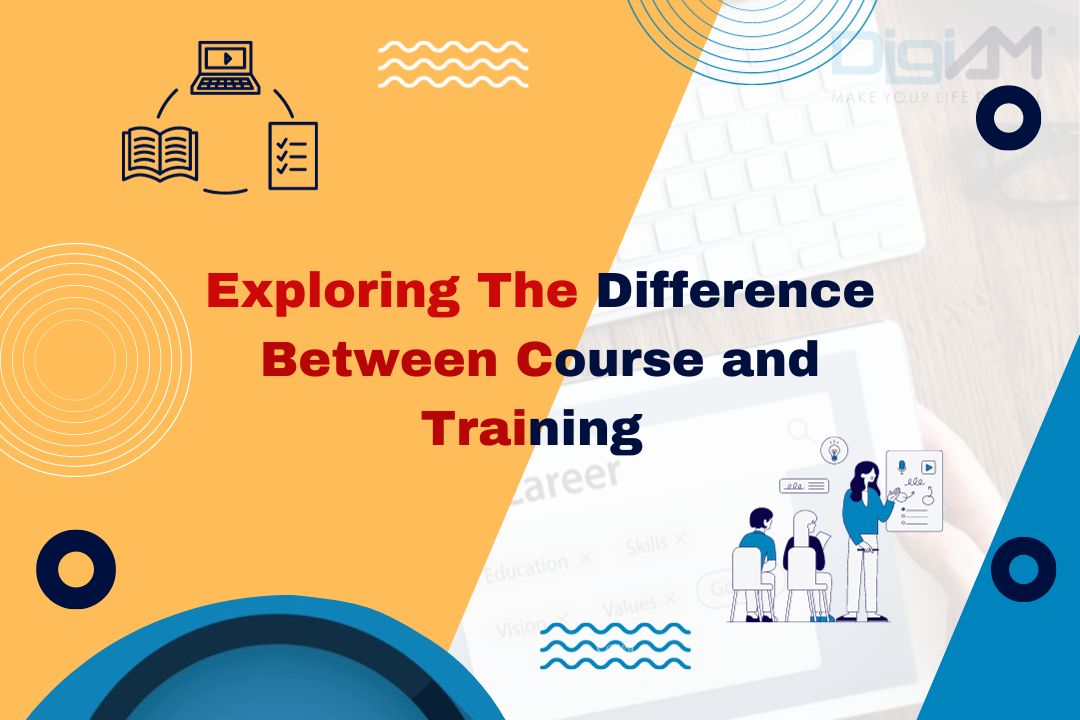
In today’s fast-paced world, the pursuit of knowledge and skill development has become increasingly essential for personal and professional growth. Two common terms you often come across in this context are “course” and “training.” While these terms are often used interchangeably, they represent distinct approaches to learning and skill acquisition. In this blog, we will delve into the comparison between course v/s training, shedding light on their unique characteristics and purposes.
What is a Course?
A course is a structured program of study designed to impart knowledge and skills in a particular subject or field. Courses are typically offered by educational institutions, such as universities, colleges, online learning platforms, or vocational schools. Here are some key characteristics of courses, that help you in understanding the difference between course v/s training.
Formal Education: Courses are often part of formal education systems and lead to academic qualifications, such as degrees, diplomas, or certificates. They are designed to provide a comprehensive understanding of a subject or field.
Curriculum-Based: Courses have a predetermined curriculum that outlines the topics to be covered, the learning objectives, and the assessment methods. The curriculum is usually standardized and developed by educational experts.
Duration: Courses can vary in duration, ranging from a few weeks to several years, depending on the level of education and the depth of the subject matter.
Instructors: Courses are typically led by qualified instructors or professors who guide students through the curriculum, facilitate discussions, and provide assessments and feedback.
Certification: Successful completion of a course usually results in the award of a degree, diploma, or certificate, which can be a valuable credential for employment or further education.
What is Training?
Training, on the other hand, is a more practical and skill-focused approach to learning. It is designed to equip individuals with the specific skills and knowledge required to perform a particular job or task effectively. Here are some main characteristics of training, that help you in understanding the difference between course v/s training.
Skill Development: Training programs are geared towards developing practical skills and competencies needed for specific roles or tasks, such as technical skills, soft skills, or job-specific knowledge.
Industry-Specific: Training is often industry-specific and tailored to the needs of a particular job or sector. It is practical and aims to bridge the gap between theory and application.
Trainers: Training is delivered by experienced professionals or subject matter experts who have hands-on experience in the field. They focus on imparting practical insights and real-world knowledge.
Hands-On Learning: Training emphasizes hands-on learning and practical exercises. Participants often engage in simulations, role-plays, and on-the-job training to apply their knowledge immediately.
Certification: While some training programs may offer certificates of completion. The primary goal of training is to prepare individuals for specific job roles or tasks. Certification may be less formal and standardized compared to courses.
Course v/s Training Key Differences:
Here are some main key differences between course v/s training:
Purpose: The primary purpose of a course is to provide a comprehensive understanding of a subject, often leading to academic qualifications. Training, on the other hand, is focused on skill development and job readiness.
Formality: Courses are typically more formal and structured, following an established curriculum. Training is often more flexible and adaptable to specific industry needs.
Duration: Courses tend to be longer in duration, while training programs are usually shorter and more targeted.
Certification: Courses usually lead to formal degrees, diplomas, or certificates, whereas training may result in industry-specific certifications or qualifications.
Conclusion
In summary, course v/s training serves distinct purposes in the realm of education and skill development. Courses are formal programs of study designed to provide comprehensive knowledge and often lead to academic qualifications. Training, on the other hand, focuses on practical skill development and job readiness, often in specific industries. Both have their place in the learning landscape. The choice between the two depends on your educational and career goals. Whether you’re looking to earn a degree or acquire job-specific skills, understanding the differences between course v/s training can help you make informed decisions about your learning journey.
Related
Related Blog
DigiAM provides a different kind of short-term job-oriented certified course / training program such as Digital Marketing, Search Engine Optimization, Google Ads Certification, Python, Graphic Designing, Video Editing, Web Designing & Development, Data Science and Data Analytics.

Learn Best Digital Marketing Course in Bareilly with Trusted Institute
DigiAM is one of India’s most reliable and trusted Digital Marketing & IT Services Companies that offers the best Digital…
READ MORE
Learn Best Digital Marketing Course in Pilibhit with Trusted Institute
DigiAM is one of India’s most reliable and trusted Digital Marketing & IT Services Companies that offers the best Digital…
READ MORE
Learn Best Digital Marketing Course in Budaun with Trusated Institute
DigiAM is one of India’s most reliable and trusted Digital Marketing & IT Services Companies that offers the best Digital…
READ MORE